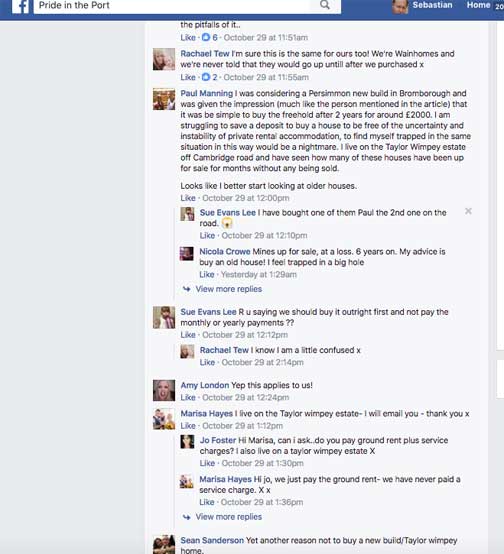
The fallout from the leasehold house scandal spread over the weekend with numerous posts on LKP and social media, and today MPs have a chance to grill housebuilders at 5pm over the issue.
This scandal erupted on Saturday in the Guardian after a succession of leasehold house owners in the North West contacted LKP.
Justin Madders MP is calling for a ban on leasehold houses and the article has prompted hundreds of comments on its website, LKP and social media.
LKP got in touch with the newspaper the owners new leasehold houses faced onerous ground rents.
One was Lindsay Lloyd, aged 29, of Matterhorn Road, Ellesmere Port who with her husband bought a leasehold house for £155,000 from Taylor Wimpey in February 2009. The house is part of the “Tudor Grange” estate.
She used the lawyers suggested by the developers, 174 Law in Birkenhead.
As the couple had not the means, they were unable to purchase the freehold of their house for £2,600 when Taylor Wimpey subsequently sold it on to E and J Estates Limited, based in Winchester. The team behind of this company can be seen here
Now that they are in a position to buy the freehold, they are informed that the cost will be £32,000.
This extraordinary sum becomes less extraordinary when one considers the ground rent terms introduced to the 999-year lease by Taylor Wimpey.
The ground rents double every 10 years five times:
£175pa ground rent from 2007
£350pa from January 2017
£700pa from 2027
£1,400pa from 2037
£2,800pa from 2047.

Another leasehold house owner is Linda (we are leaving out her full name), a property investor, who last year bought two Taylor Wimpey resale houses in Heywood, in Greater Manchester.
She paid £109,000 for a leasehold house that cost £125,000 when new in 2012 and £122,000 for a house that cost £155,000 new in 2012.
The ground rents are:
£295pa from 2008
£595pa from 2018
£1,170pa from 2028
£2,340pa from 2038
£4,680pa from 2048
£9,360pa from 2058?
The exact wording of the lease concerning ground rent reviews is the following and LKP has asked Taylor Wimpey whether it believes ground rents end at £4,680pa or £9,360pa, as the wording is not that obvious. Here it is:
“Review Dates” Means (subject to the provisions of Clause 6.2 hereof) the tenth anniversary of the date of commencement of the Term and each successive tenth anniversary thereafter until the fiftieth anniversary of the Term”
In a reply to Sir Peter Bottomley, as a patron of LKP, James Jordan, Taylor Wimpey’s group legal director and company secretary, said:
“Ground rent terms for all of our leasehold properties are clearly outlined during the sales process and in the individual property leases and it is of course the responsibility of the buyers’ lawyer to explain the lease provisions to the customer as part of the conveyancing process.”
Mr Jordan emphasised independence of the lawyers suggested to Taylors Wimpey’s customers:
“Please note that Taylor Wimpey does not formally recommend lawyers when selling properties. We put forward a choice of wholly independent lawyers who specialise in new build properties, on the understanding that they deliver the highest level of independent service and advice to our customers.”
Mr Jordan’s full statement is below.
It is clear that Taylor Wimpey is not alone in this racket. Both Persimmon and Bellway homes are also building leasehold houses, and it is an open question how many smaller housebuilders are getting in on the act.
There are around one million leasehold houses in the country, but the overwhelming majority of them are historic leasehold.
LKP was contacted by a potential buyer at Persimmon’s The Village, in Aveley, in Essex, where a potential buyer was extremely concerned to discover that a £325,000 house was for sale with leasehold tenure with a 999 year lease, ground rent of £150pa and £400 a year service charges.
What will concern MPs is that the potential buyer of this property was being assisted by the government’s own Help to Buy scheme.
The arrangement appears very similar to Persimmon’s leasehold houses at London Road, Peterborough, reported on the Leasehold Knowledge Partnership website and in the Daily Mail here:
The Guardian also reported Persimmon selling leasehold houses at Agusta Park
“It is easy for buyers to miss the fact that the property is leasehold,” wrote Patrick Collinson, the Guardian’s personal finance editor. “… We could find no prominent mention on Persimmon’s website, or in the brochure, that the homes were leasehold.”

The sales staff wrongly stated that 999 year leases were “virtually freehold”, and ground rent seemed to start at £150 then £190, linked to RPI. The sales staff were inconsistent.
In August LKP wrote to Jeffrey Fairburn, the CEO of Persimmon asking for a copy of the leases at The Village, Aveley, in Essex.
It was not provided.
Both Persimmon and Taylor Wimpey have been shifty and evasive over the issue of leasehold houses. Taylor Wimpey even claims leasehold houses are “standard practice” in some parts of the country, which is utter rubbish. There are a million leasehold houses in the country, but they are overwhelmingly historic properties.
The shyness of the housebuilder executives is in direct contrast to their public statements.
Here is Mr Fairburn on the Persimmon website:
“The housebuilding sector is attracting ever greater scrutiny from different stakeholders and for different reasons. This is something we welcome as only by creating a shared understanding of the challenges we face will we be able to identify and implement effective and sustainable solutions that benefit not just our industry but the country.”
Meanwhile, Peter “Pete” Redfern, CEO of Taylor Wimpey, is keeping his head down and has not responded at all.
Justin Madders, Labour MP for Ellesmere Port and Neston, is calling for a ban on leasehold houses.
“It is clear this system is being abused to drive huge profits at ordinary homeowners’ expense. There is no need for there to be leasehold properties, particularly those on an estate where the properties are mainly detached houses,” said Mr Madders.
Comments have flooded in to the Pride in the Port Facebook page, for Ellesmere Port residents, and can be read here:
Taylor Wimpey response to LKP, via patron Sir Peter Bottomley
Dear Sir Peter,
Thank you again for your email of the 20 October and also for the email from Sebastian O’Kelly dated 18 October.
Firstly if I may deal with Mrs. Lloyds (30 Matterhorn Road) and the points raised by Sebastian O’Kelly.
The Lease in respect of this to this property has been reviewed and the Rent Review provisions are as detailed in Sebastian’s email. I understand that the nature of the ground rent terms at Tudor Grange reflect standard practice at the time that they were agreed.
Please note that Taylor Wimpey does not formally recommend lawyers when selling properties. We put forward a choice of wholly independent lawyers who specialise in new build properties, on the understanding that they deliver the highest level of independent service and advice to our customers. It is always for the customer to decide whether to use one of these firms and there is no obligation whatsoever for any customer to do so. It is entirely the individual customer’s choice and decision on who to instruct. It is absolutely the customer who appoints the lawyer and not Taylor Wimpey.
Ground rent terms for all of our leasehold properties are clearly outlined during the sales process and in the individual property leases and it is of course the responsibility of the buyers’ lawyer to explain the lease provisions to the customer as part of the conveyancing process.
In the case of Mrs. Lloyd, she and the other leaseholders on the development were given notice of Taylor Wimpey’s intention to sell the freehold reversion in their properties, therefore having an opportunity to acquire the freehold, should they so wish prior to the freehold being sold to E&J Ground Rents No. 6 LLP.
As mentioned previously, the ground rent and rent reviews were standard practice and commercial sound, and therefore there will be Taylor Wimpey’s Developments with similar provisions.
The Tudor Grange Development was sold E&J Ground Rents No. 6 LLP (Co. Registration Number OC383340) registered office 1c Belmore Hill Court, Morestead Road, Owlesbury Winchester SO21 1JW on the 11 December 2013, as part of a portfolio consisting of a number of freeholds.
Unfortunately we cannot be precise with the current market values of the lease in question. The price for the freehold reversion is determined by a number of factors such as location, property type and value, length of lease at the time of request, rent, marriage values and economic climate; we certainly saw a sharp rise in freehold prices in 2015.
With regard to commonhold, there would seem to be a number of pros and cons with regard to this form of ownership and since 2002, as you will know, far better than anybody, it has only been rarely used in the industry and not all lenders are indeed customers are comfortable with a new system. We will continue to monitor developments in this area.
The arrangements for our 2017 AGM are not yet finalised or announced but would typically take place towards the end of April.
Thank you for bringing this matter to our attention. If you require any further information or wish to discuss then please do not hesitate to make contact.
Yours sincerely,
James Jordan
Taylor Wimpey, head of legal and company secretary
Persimmon response to LKP
Dear Mr O’Kelly
Our Chief Executive Jeff Fairburn has passed me your email of 26 August and requested that I respond on behalf of the Group.
Persimmon, together with many UK developers sells a mixture of both leasehold and freehold properties. As Persimmon has acquired other companies over the decades, it has inherited the freehold reversions of leasehold properties sold by those businesses. However the Persimmon Group has never held any freehold reversions in offshore companies.
The UK housing stock currently stands at approximately 28 million dwellings. There are around 3 million leaseholders in Britain. All Persimmon leasehold houses carry an extremely long 999 year lease and customers are always informed at purchase what type of property they are buying. Persimmon leasehold houses typically have a small annual ground rent of around £150 p.a.
No consents are required under the terms of the Persimmon standard leases from the freeholder to use the property as a residential dwelling, so no sub-letting consent is required.
Further no consent is required from Persimmon or the freeholder for any internal alterations, provided they are not structural. The only time that an owner would need consent from Persimmon/the freeholder would be where any alterations could affect the structure of the property and invalidate the 10 year warranty issued on the date of first sale.
Any service charges that are payable on Persimmon Group house sales are paid to a residents management company which is set up by Persimmon Group as a company limited by guarantee. Those companies will be owner controlled by the residents and are put in place for the maintenance and upkeep of shared facilities on each estate, such as open space and play areas. Control of future service charges will always rest with the residents who are free to appoint a managing agent to look after the company if so required.
Yours sincerely
Neil Francis
Company Secretary and Legal Director
Persimmon plc
Persimmon House
Fulford
York YO19 4FE





 Disgraceful leasehold houses reported in Guardian today
Disgraceful leasehold houses reported in Guardian today






















In light of the statement from the Persimmon Company Secretary we invite any of our RICS member readers to comment on the suggestion that modifying your house (freehold or leasehold) in the first ten years would invalidate an NHBC warranty.
We would also welcome comment from those specalising in this field about the difference between the developers defect period where the developer is liable to pay to fix an issue and those matters covered by the 10 years NHBC warranty.
Having perused the NHBC website, it appears the NHBC basically covers failures in building and associated consequences flowing that do not comply with NHBC building standards.
Clearly that has nothing whatsoever to do with any modifications.
According to the Buildmark warranty conditions the guarantee does not cover any work done to the property after completion, unless done by the original builder to meet his responsibilities under the Buildmark conditions.